US State Department Launches US-Afghan Consultative Mechanism
By Elaine Pasquini

Washington: On July 28, the United States Department of State, in partnership with the Atlantic Council, Georgetown University’s Institute for Women, Peace and Security, the Sisterhood is Global Institute and the US Institute for Peace, launched the US-Afghan Consultative Mechanism. The aim of the USACM is to provide an international platform to protect the rights of Afghans, identify and hold accountable human rights violators and determine ways the US and the international community can support a more inclusive and peaceful Afghanistan.
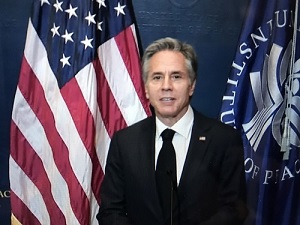
Antony J. Blinken. |
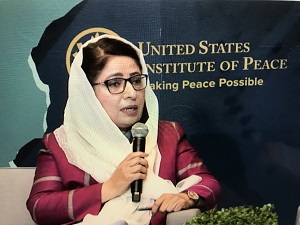
Asila Wardak |
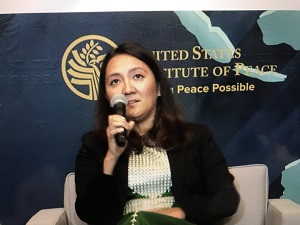
Naheed Sarabi
|
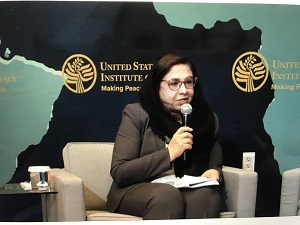
Palwasha Hassan |
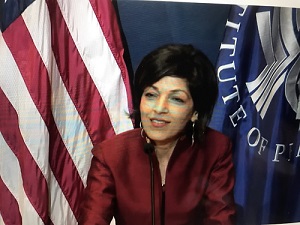
Rina Amiri |
“Since the Taliban took over a year ago, they reversed a great deal of the openness and progress that had been made over the previous decades,” US Secretary of State Antony J. Blinken said. “As a report released yesterday by Amnesty International shows, the Taliban have strictly and systematically restricted women and girls’ rights to free movement, decimated the system supporting domestic violence victims and contributed to surging rates of child early and forced marriage. For 314 days and counting the girls in Afghanistan have sat at home while their brothers and cousins have been receiving education.”
The secretary praised the tenacity and strength of Afghan women who, in the face of threats, violence and intimidation, openly protested the injustices committed by the Taliban over the past months. “These women have never stopped believing in a brighter future for their country,” he pointed out. “They are determined to do all they can to make that future real.”
Pledging the continued support of the United States to “amplify these voices and…support progress for Afghan women, girls and other at-risk populations, Blinken insisted that the establishment of the USACM “is going to make it easier for Afghan civil society groups to communicate and collaborate with American policymakers across a whole range of shared priorities.”
Rina Amiri, US Special Envoy for Afghan Women, Girls and Human Rights, commended the “vitality, spirit and commitment” of Afghan women leaders and their supporters in Washington that enabled the progress for women in Afghanistan prior to the withdrawal of American troops in August 2021. “What is encouraging for me is that I have heard from those voices over and over again…that it is not going to be a question of if, but how, to support the Afghan people,” she recounted. “We need to look at this not in terms of the tremendous challenges of today, but of the short-term, medium-term and the long-term.”
Maintaining some form of engagement with the Taliban is necessary, Amiri said, particularly to address the situation of Afghans inside the country who are facing a desperate situation, noting however that no one wants to give the Taliban space to present to the world the false impression that they are engaging in good faith on these issues.
Amiri related comments by a female activist in Afghanistan, using the pseudonym of Maryam for safety reasons, who stressed the need to support the local communities that know best what their needs are.
Despite multiple commitments by the Taliban on education, secondary school doors remain closed to Afghan girls, Palwasha Hassan, a senior fellow at the Institute for Women, Peace and Security at Georgetown University, said. And in order to persuade the Taliban to reverse this decision “the US should strongly engage Islamic countries as they can effectively demonstrate the compatibility of girls’ schooling within Islam or within Islamic countries.”
In the meantime, in order to prevent a gap in Afghan girls’ education, educational alternatives need to be considered.
Throughout many years of conflict in Afghanistan, several initiatives were offered, including homeschooling, peer learning education and online education. These options are available and should be supported, but these should not be considered as substitutes for formal education in Afghanistan, she said.
“Afghan youth, especially our girls, need to be part of the future stability and peace in Afghanistan and that can only be done if they are educated.”
In addition to educational concerns, poverty has heightened a dire economic situation leaving many women and men concerned about how to feed their children.
The USACM initiative will move informal discussions to a formal platform and shows the commitment of the US government, said Asila Wardak, a senior fellow at Harvard University’s Radcliffe Institute. “The beauty of Afghanistan is its diversity with multi-ethnicities, and everyone should be included, not just civil society, but marginalized people, women and youth.”
It is important to keep in mind, Wardak said, that while “the Taliban are the reality of the country,” other realities are the women, youth, civil society, “those on the frontline fighting terrorism.”
From an economist’s viewpoint, Naheed Sarabi of the Brookings Institution and previous deputy minister for policy in Afghanistan’s finance ministry, noted the great headway Afghan women have made in the past 20 years in both the public and private sectors.
Prior to August 15, 2021, women comprised 22 percent of the workforce in Afghanistan. In the public sector women were 27 percent of the 400,000 civil servants and 38 percent of teachers in Afghanistan were women. In the private sector women made great progress. They established the Afghan Women’s Chamber of Commerce and according to their data there were over 3,000 licensed small and medium businesses and over 54,000 unlicensed businesses.
“We are talking of a huge accomplishment and contribution, earning income and contributing to the well-being of themselves, their families and society,” she noted. But after August 15, 2021, according to the World Bank, there was a 75 percent reduction in women’s employment and many women’s businesses shut down.
“Political, social and economic empowerment go hand in hand…but our hope is that if there is consistent economic empowerment and support women will gain the ground and stand on their feet,” she said. “It is necessary to continue to engage with women on the ground…and to have their voices heard in whatever is being delivered on the ground.”
(Elaine Pasquini is a freelance journalist. Her reports appear in the Washington Report on Middle East Affairs and Nuze.Ink.)

